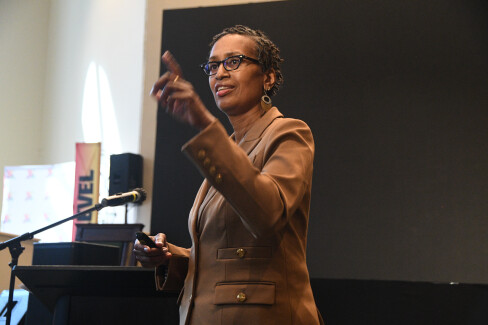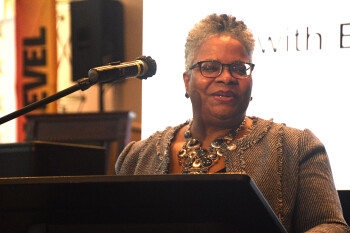Next Level event addresses trauma-informed ministry
By Melissa Lauber
 Strength, hope and courage – these are the gifts Dr. Deborah Haskins brought to the leaders gathered at the Next Level Speaker Series on March 7. They are gifts that no church leader can be without, especially in an age where the world seems to be breaking, living amid “sorrow upon sorrow,” said Bishop LaTrelle Miller Easterling.
Strength, hope and courage – these are the gifts Dr. Deborah Haskins brought to the leaders gathered at the Next Level Speaker Series on March 7. They are gifts that no church leader can be without, especially in an age where the world seems to be breaking, living amid “sorrow upon sorrow,” said Bishop LaTrelle Miller Easterling.
Bishop Easterling hosted Haskins for a daylong conversation on the church and trauma-informed and trauma-responsive care and ministry. Leaders from the Baltimore-Washington and Peninsula-Delaware Conferences gathered at Westphalia UMC in Upper Marlboro, and online, to move past polite denials and quick fixes. They sought to discover how to effectively and faithfully address the physical unrest and illness, emotional pain and anguish, and spiritual dissonance and devastation brought on by trauma.
Haskins began with a simple definition. Trauma, she said, “is the normal response to events that are abnormal.”
“But the pain of trauma does not feel normal,” Haskins stressed. “It’s like someone stabbed you in the chest with a butcher knife. It’s not a surgical incision, there are jagged edges. That’s what the person suffering feels like. It opens you up in a very broad way.”
She knows firsthand about the pain. In 2014, on the day before Mother’s Day, her life was interrupted by news that her son, Joseph, had been murdered in an act of random violence. A year later, her nephew was murdered. As a result of this heartbreak, her husband, the Rev. Bruch Haskins, who already had heart challenges, experienced a major medical crisis. He died in 2016.
 “When this hits you personally, all the scholarly stuff goes right out the door,” Haskins said. However, the bishop noted, some of Haskin’s deepest learnings “have come through the crucible of life. Her life is a testament to the fact that mental health and faith need not be estranged.”
“When this hits you personally, all the scholarly stuff goes right out the door,” Haskins said. However, the bishop noted, some of Haskin’s deepest learnings “have come through the crucible of life. Her life is a testament to the fact that mental health and faith need not be estranged.”
Haskins drew upon her faith and coupled it with more than 40 years of learning and professional practice to instruct church leaders
Some basic facts about trauma, Haskins shared:
- Trauma interrupts people’s narratives. Too often, we don’t know each other’s stories.
- Recognize that trauma is everywhere. People are allowed to manage their own stories, but be sensitive to underlying trauma that you may not be aware of.
- Those experiencing trauma can experience a loss of safety, trust, and self-worth, shame, chronic illness, depression, anxiety and much more. They are 15 times more likely to commit suicide and four times more likely to become addicted to alcohol or other substances.
- Recovery and healing is not a straight line and it is not an intellectual process. Denial is a defense mechanism.
- A person’s trauma can color their experiences of God.
There are three broad stages of trauma response. First, stabilize the situation and manage the symptoms; second, participate in trauma therapy with a professional therapist or counselor; and third, reconnect to others, oneself, and life.
Among the advice Haskins offered to pastors or other church leaders responding to people who have experienced trauma:
- Be careful about rushing in prematurely, wanting to fix or change things and giving people theological, biblical or other prescriptions. These prescriptions aren’t enough. They’re not sufficient.
- Be welcoming and nonjudgmental. Be transparent and trustworthy; intentionally take care not to stigmatize people.
- Refer people to, or offer in your church, peer support services like 12-step recovery programs and a meeting space for NAMI, the National Alliance on Mental Illness.
- Each of us needs to figure out what kind of boundaries we need that will help us in our thriving. Boundaries are fences and there are different kinds – some are hard as steel, others are more open.
- Let go of the “Jesus complex.” Church leaders can model what authentic wholeness and healing looks like, even where there is pain and loss to reckon with.
- Every leader should gift themselves with regularly seeing a professional counselor.
Haskins encouraged everyone there to learn psychological first aid, which teaches and equips people with crisis intervention. This method of response teaches you how to stabilize people in crisis and then make an effective referral. Every church should also have a trauma-informed care and response team, she said.
There is beauty in brokenness, concluded Haskins. She encouraged all those present to look deeply in the mirror and to find hope in offering trauma-informed care.
“We need to understand that this is an effort that is long-term,” she said. It’s caring for the body, heart, spirit, and family. It’s about resilience and, when you fall, how you get back up. It’s recognizing that this is where the hard work comes and being open to leading with innovation and being open to questions and trying new things.
“We have to meet people where they are,” Haskins said. “What’s the good news? God can use us.”
